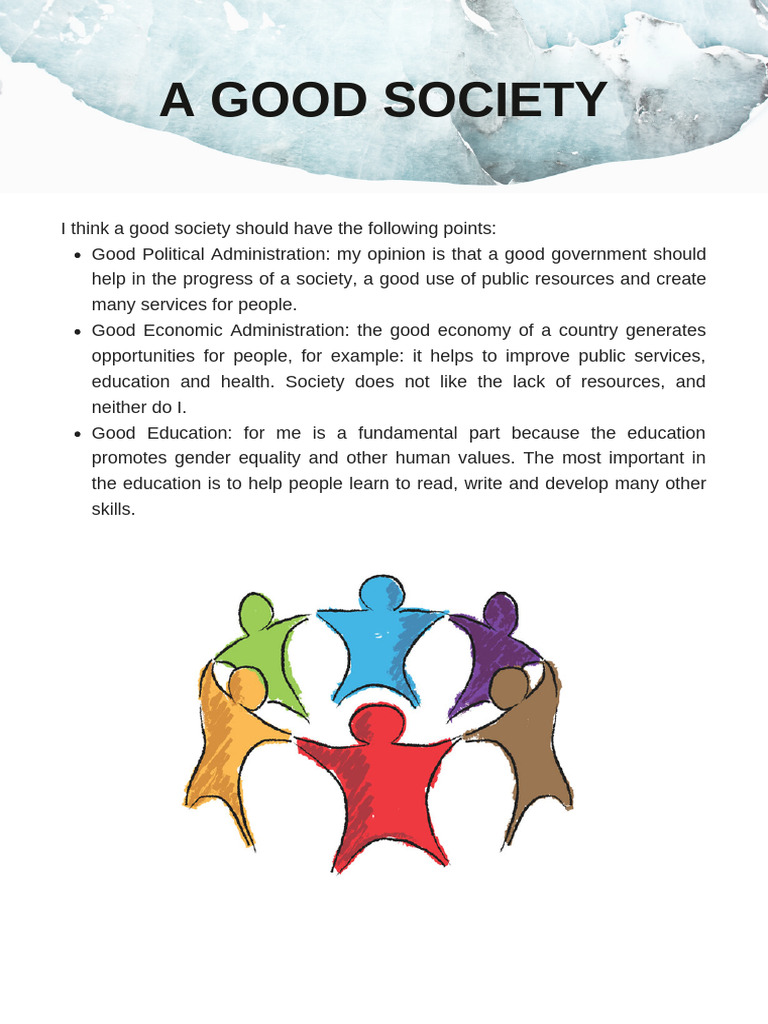The concept of a “good society” encapsulates an ideal that transcends mere material prosperity; it is an intricate tapestry woven from ethical, spiritual, and social threads. Within the realm of Bahá’í teachings, a good society is delineated not only by its economic and legal structures but also by its nurturing of a collective identity grounded in service, compassion, and unity. This exploration invites readers to ponder the transformative potential inherent in these teachings and challenge their preconceived notions of what constitutes societal well-being.
At the heart of Bahá’í philosophy lies the principle of the oneness of humanity—an assertion that transcends racial, national, and religious boundaries. This foundational tenet posits that humanity is essentially a single entity, and understanding this unity is paramount in the cultivation of a good society. To engender a society that thrives, attention must be directed towards fostering understanding and appreciation of diverse backgrounds and perspectives.
The elevation of individual consciousness is critical in nurturing societal maturity. The Bahá’í teachings assert that personal development is inextricably linked to collective progress. To build a good society, individuals are called upon to engage in self-reflection and spiritual growth, which, in turn, shapes the moral fabric of the community. A society that values education—intellectual and spiritual—is one that empowers its members to pursue enlightenment and ethical living.
Furthermore, justice is an indispensable pillar of a good society. The Bahá’í writings emphasize that true justice acknowledges the inherent dignity of every individual, fostering an environment where equity prevails. A society entrenched in justice does not merely address the symptoms of inequality but rather unearths and rectifies the systemic issues at play. This holistic approach ensures that marginalized voices are not just heard but are fundamental in the societal discourse.
In the pursuit of a cohesive society, the role of service cannot be overstated. The Bahá’í Faith advocates for an ethic of service as a primary means of individual contribution to the greater good. Volunteering, altruism, and community engagement are instrumental in weaving a robust social fabric. It urges individuals to transcend self-interest and embrace the interconnectedness of all people. By actively participating in the well-being of others, individuals nurture a profound sense of belonging and responsibility, which further fortifies the societal structure.
Another pivotal aspect of a good society is the principle of consultation. The Bahá’í writings extol the virtues of collective decision-making processes where diverse perspectives converge. This consultative approach fosters transparency, promotes democratic ideals, and mitigates conflict. When stakeholders engage in open dialogues, the resultant synergy can yield innovative solutions to societal challenges. The active solicitation of diverse viewpoints champions inclusivity, which is fundamental to the evolution of a good society.
Moreover, an enlightened society must advocate for the rights and education of women. The Bahá’í teachings assert that gender equality is not merely a humanitarian concern but a prerequisite for societal development. Women’s indispensable contributions are recognized as catalysts for progress. Thus, enabling women’s participation in all spheres of life, from governance to education, enhances the overall resilience and dynamism of society.
Amidst these principles, the nurturing of spiritual values is essential. In a world often marred by materialism, the Bahá’í vision encourages a shift in focus towards spiritual excellences such as love, compassion, and trustworthiness. These values act as keystones for interactions among individuals, cultivating a societal ethos rooted in mutual respect and understanding. When spiritual principles govern human behavior, the impact reverberates through the community, promoting harmony and reducing antagonism.
The interconnectedness of these teachings manifests in a reciprocal relationship: as individuals cultivate their spiritual and ethical capacities, they enhance societal conditions. Similarly, the collective societal ethos can inspire individuals to reach higher planes of personal development. This symbiotic relationship engenders a sustainable trajectory of growth for a good society.
A good society, as envisioned through the lens of Bahá’í teachings, is both an aspiration and a tangible goal, requiring commitment and cooperation. Each individual plays a crucial role in this transformative endeavor. The collective responsibilities borne by members of society foster a culture that celebrates diversity, seeks justice, engages in service, embraces consultation, empowers women, and nurtures spiritual growth.
The age we inhabit demands a profound re-examination of societal norms and values. To catalyze a shift in perspective, it is imperative to approach these teachings with an open mind, considering their applicability not only to individual lives but also to the larger context of collective existence. The challenge is not merely the implementation of these principles but the awakening of a conscientious populace that dares to envision a society replete with possibility and hope.
Ultimately, the Bahá’í perspective on what defines a good society is as much about individual transformation as it is about communal evolution. It encourages a reflective inquiry—an existential examination of our roles and our responsibilities to one another. The steadfast commitment to spiritual and social ideals provides a roadmap to navigate the complexities of life in the modern age, igniting curiosity and inspiring action towards the creation of a truly good society.
